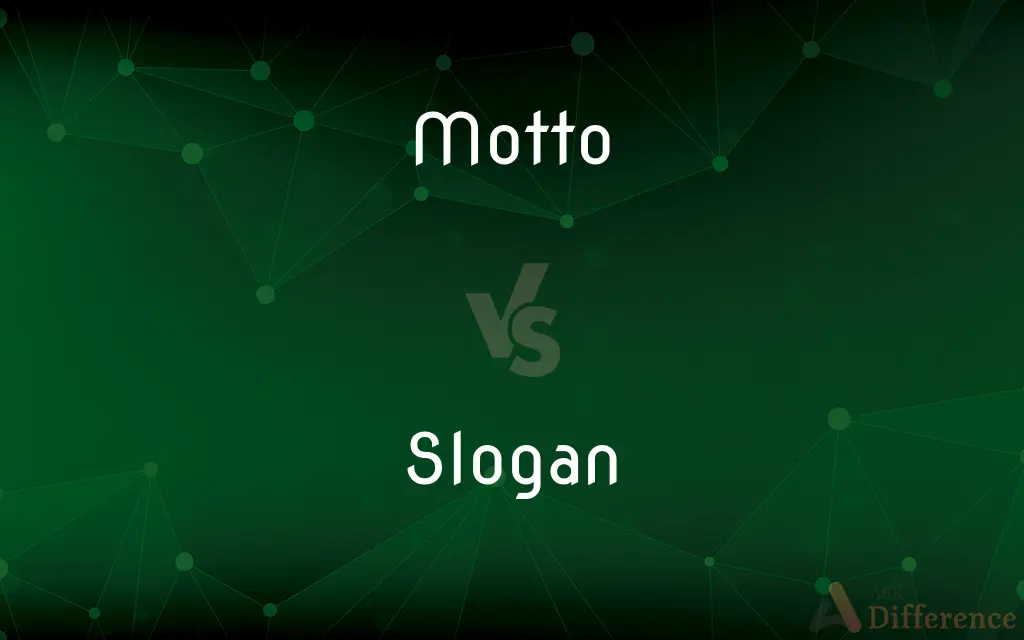Motto vs. Slogan — What's the Difference?
Edited by Tayyaba Rehman — By Fiza Rafique — Updated on October 13, 2023
Motto is a phrase expressing fundamental values or beliefs, while a slogan is a catchy phrase used in advertising or promoting an idea or product.

Difference Between Motto and Slogan
Table of Contents
ADVERTISEMENT
Key Differences
Motto is often a phrase that succinctly encapsulates an entity’s guiding principles, while a slogan, alternatively, primarily aims to be catchy and memorable for promotional purposes.
A motto is frequently adopted by organizations, countries, or individuals to convey underlying beliefs or philosophies. Slogan, however, is usually crafted with the intention of being easily remembered and is often used in marketing campaigns.
Motto tends to be enduring and seldom changes as it reflects core values or a perpetual philosophy. Slogans, conversely, may evolve, adapting to different campaigns, products, or market dynamics to remain relevant and impactful.
While a motto can inspire internal and external audiences by elucidating enduring principles, a slogan typically targets external audiences, aiming to generate interest, sales, or adherence to a campaign.
Notably, a motto may not necessarily require frequent repetition or visibility, as it's intrinsic to an entity's ethos. Slogans, in contrast, are designed for repetitive use and high visibility, intending to infiltrate public consciousness to drive particular actions or behaviors.
ADVERTISEMENT
Comparison Chart
Primary Purpose
Expressing fundamental beliefs
Promoting or advertising
Target Audience
Internal and external
Mainly external
Duration & Consistency
Generally enduring and stable
Can change with campaigns
Visibility & Usage
Not necessarily high or repetitive
Designed for high visibility and repetition
Emotional Appeal
May provide inspiration and direction
Primarily aims to be catchy and memorable
Compare with Definitions
Motto
Motto serves as a perpetual reminder of core values.
In God We Trust is the United States’ motto.
Slogan
A slogan is a phrase created to promote or advertise.
Just Do It is a famous slogan by Nike.
Motto
A motto conveys an individual's or entity’s guiding principles.
Semper Fidelis is the motto of the United States Marine Corps.
Slogan
Slogan seeks to be catchy and easily memorable.
I’m Lovin’ It is a well-known slogan of McDonald's.
Motto
Motto aims to inspire and guide rather than promote.
The scout’s motto is Be Prepared.
Slogan
Slogan is typically linked to marketing and campaigning.
Red Bull Gives You Wings is a slogan from Red Bull.
Motto
A motto might reflect collective aspirations or commitments.
The Olympic motto is Faster, Higher, Stronger.
Slogan
Slogan aims to persuade or inform in a succinct manner.
Think Different was a slogan employed by Apple.
Motto
A motto (derived from the Latin muttum, 'mutter', by way of Italian motto, 'word', 'sentence') is the general motivation or intention of an individual, family, social group or organization. Mottos are usually found predominantly in written form (unlike slogans, which may also be expressed orally), and may stem from long traditions of social foundations, or from significant events, such as a civil war or a revolution.
Slogan
A slogan might articulate a unique selling proposition.
Have a Break, Have a Kit Kat is a slogan by Kit Kat.
Motto
A short sentence or phrase chosen as encapsulating the beliefs or ideals of an individual, family, or institution
The family motto is ‘Faithful though Unfortunate’
Slogan
A slogan is a memorable motto or phrase used in a clan, political, commercial, religious, and other context as a repetitive expression of an idea or purpose, with the goal of persuading members of the public or a more defined target group. The Oxford Dictionary of English defines a slogan as "a short and striking or memorable phrase used in advertising." A slogan usually has the attributes of being memorable, very concise and appealing to the audience.
Motto
A phrase which recurs throughout a musical work and has some symbolical significance
They were developing the use of leitmotifs or mottoes that appear throughout an opera
Slogan
A phrase expressing the aims or nature of an enterprise, organization, or candidate; a motto.
Motto
A brief statement used to express a principle, goal, or ideal
“We explain that when someone is cruel, or acts like a bully, you don't stoop to their level—no, our motto is ‘when they go low, we go high'” (Michelle Obama).
Slogan
A phrase used repeatedly, as in advertising or promotion
"all the slogans and shibboleths coined out of the ideals of the peoples for the uses of imperialism" (Margaret Sanger).
Motto
(heraldry) A sentence, phrase, or word, forming part of an heraldic achievement.
Slogan
A battle cry of a Scottish clan.
Motto
A sentence, phrase, or word, prefixed to an essay, discourse, chapter, canto, or the like, suggestive of its subject matter; a short, suggestive expression of a guiding principle; a maxim.
Slogan
A distinctive phrase of a person or group of people (such as a movement or political party); a motto.
Motto
(obsolete) A paper packet containing a sweetmeat, cracker, etc., together with a scrap of paper bearing a motto.
Slogan
(advertising) A catchphrase associated with a product or service being advertised.
Motto
(intransitive) To compose mottos.
Slogan
(obsolete) A battle cry among the ancient Irish or highlanders of Scotland.
Motto
A sentence, phrase, or word, forming part of an heraldic achievment.
Slogan
The war cry, or gathering word, of a Highland clan in Scotland.
Motto
A sentence, phrase, or word, prefixed to an essay, discourse, chapter, canto, or the like, suggestive of its subject matter; a short, suggestive expression of a guiding principle; a maxim.
It was the motto of a bishop eminent for his piety and good works, . . . "Serve God, and be cheerful."
Slogan
A distinctive motto, phrase, or cry used by any person or party to express a purpose or ideal; a catchphrase; a rallying cry.
Motto
A favorite saying of a sect or political group
Slogan
A favorite saying of a sect or political group
Motto
A motto often encapsulates philosophical beliefs or ideologies.
Liberty, Equality, Fraternity is the motto of France.
Common Curiosities
What characterizes a slogan?
A slogan is a catchy, memorable phrase used primarily for advertising or promotion.
Can a slogan be a motto?
While both are phrases, a slogan is typically promotional, whereas a motto represents core values.
How visible is a motto in comparison to a slogan?
A slogan is often more visible, being used repetitively in marketing, while a motto may have a subtler presence.
Is a motto always short?
While mottoes are often succinct, their length can vary as long as they convey the intended beliefs or values.
Is a motto meant to be catchy?
A motto may or may not be catchy as its purpose is to convey beliefs, not necessarily to attract attention.
Can a business have both a motto and a slogan?
Yes, a business can have a motto to express its values and a slogan for its advertising efforts.
Are slogans always associated with products?
Not always, slogans can also be associated with movements, campaigns, or ideas, not just products.
What is a motto?
A motto is a short phrase that encapsulates an entity’s core values or beliefs.
Is a motto used for advertising?
Generally, a motto is not created for advertising but to express underlying principles.
Does a motto change frequently?
Mottoes are usually stable, reflecting enduring principles and seldom changing.
Who is the primary target of a slogan?
Slogans primarily target external audiences, aiming to drive specific actions or behaviors.
Can a motto be used in advertising?
It can be, but mottoes are generally not crafted with advertising as their primary intent.
How are slogans developed?
Slogans are often developed considering factors like memorability, catchiness, and alignment with campaign goals.
Why do entities adopt mottoes?
Entities adopt mottoes to succinctly express, internalize, and communicate their foundational beliefs or values.
How frequently do slogans change?
Slogans can change with different campaigns, adapting to marketing needs and trends.
Share Your Discovery

Previous Comparison
Larva vs. Pupa
Next Comparison
Prepaid vs. PostpaidAuthor Spotlight
Written by
Fiza RafiqueFiza Rafique is a skilled content writer at AskDifference.com, where she meticulously refines and enhances written pieces. Drawing from her vast editorial expertise, Fiza ensures clarity, accuracy, and precision in every article. Passionate about language, she continually seeks to elevate the quality of content for readers worldwide.
Edited by
Tayyaba RehmanTayyaba Rehman is a distinguished writer, currently serving as a primary contributor to askdifference.com. As a researcher in semantics and etymology, Tayyaba's passion for the complexity of languages and their distinctions has found a perfect home on the platform. Tayyaba delves into the intricacies of language, distinguishing between commonly confused words and phrases, thereby providing clarity for readers worldwide.
















































